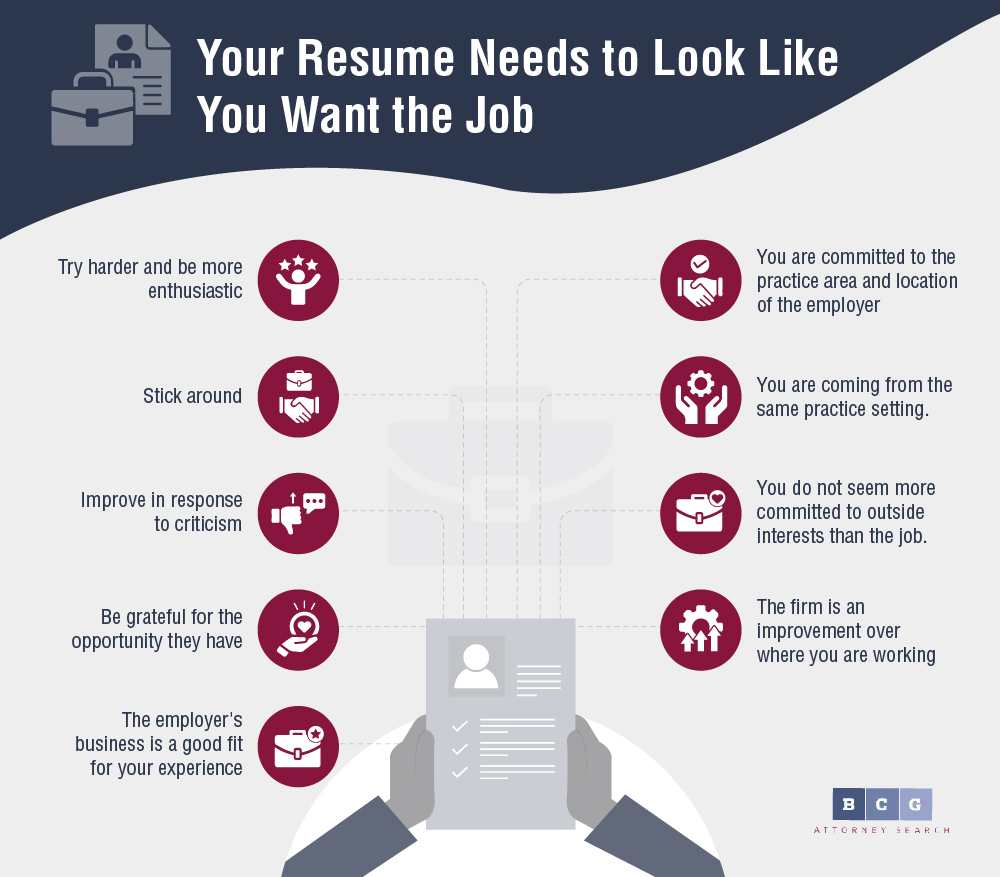
Here are the factors that traditionally affect the number of interviews you receive:
1. Your Chances Of Being Interviewed By A Law Firm Depend On Whether Or Not You Seem To Be Qualified For The Job

Almost all law firms hire people to do a specific type of work. You will not get hired unless your resume presents you as the sort of person who can do the law firm's job.
Your resume needs to SCREAM that you are the right person for the SPECIFIC JOB description and practice area you are applying to

- If a law firm has a job opening for a corporate M&A associate, it is not looking for a securities attorney.
- If a plaintiff’s personal injury law firm has a personal injury job opening, it is not looking for a commercial litigation defense attorney who also does corporate law.
- If a law firm is seeking someone to do patent prosecution work in the physics field, it will not be interested in a trademark attorney with a degree in biology.
One of the worst mistakes that attorneys job seekers make when seeking specific types of jobs is to clutter their resumes and cover letters with all sorts of irrelevant work experience. Legal employers do not want to see irrelevant work experience with nothing to do with their current opening. You may be proud that you did a bunch of different types of law practice in your previous jobs (or your current one), but law firms want to hire attorneys who are the best fit for their openings. In most instances, attorneys are employed with the most relevant legal experience. These quick changes work best when guided by clarity of purpose—see Why Focus Matters: Tailoring Your Legal Resume to Stand Out for how focus creates impact.
For example, if you are applying for a position doing environmental litigation, the smartest thing you can do is make it look like this is all you do and have ever been interested in. Your jobs before and during law school might have been environmental-oriented. Maybe you were in an environmental journal. Or perhaps you worked for the EPA one summer.
Showing a focus in the practice area is most likely to get you hired. If you have the legal experience that does not match the opening requirements, or it seems like you are interested in something else, this will hurt you.
Sometimes people will put stuff all over their resume that makes it look like they are interested in something completely different than what they are doing. We frequently see resumes that discuss interests completely unrelated to the sort of job the person is trying to get.
- Not too long ago, I worked with a woman in a major American city who had graduated near the top of her class at Columbia Law School and had spent the past four years doing plaintiff’s labor and employment litigation. She was interested in switching over to labor and employment defense. Despite a stellar record, most defense law firms would not interview her because they did not like that she had been a plaintiff’s labor and employment attorney.
An attorney interested in corporate law should not discuss all the litigation experience. It just does not look good. Law firms want to hire people they know can do their job.
- Suppose you are applying for a position doing construction litigation. In that case, you should do your best to remove and tone down anything on your resume that discusses other practice areas and experience you have gotten—such as labor and employment litigation. That is a liability. The law firm wants to hire specialist knowledge; they believe hiring someone with varied experience is dangerous because you may not be focused on their practice area.

Remove information from your resume that has nothing to do with the job the law firm has open

One of the biggest mistakes people make when seeking positions is to clutter their resumes with information and experience unrelated to working in a law firm. Law firms want to hire people interested in practicing law only in the practice area they have an opening for and not doing other work unrelated to practicing law.
People seeking jobs in law firms will often have information related to social justice or divisive social or political issues (organizations and employment related to addressing social justice-related problems). There is nothing wrong with having these interests, and these sorts of people can change the world. Nevertheless, when you do a job search in a law firm, you need to appear most interested in what the law firm is doing and not your own political or social agenda. Your resume would be much better off if it contained references to articles and other information relevant to your practice area than discussions about how you are interested in and motivated by different social issues.
- I recently saw a resume and cover letter of an attorney in New York City who was very interested in freeing Palestine and was having difficulty getting interviews. All of his interests and experience appeared related to this. His resume referenced this at least ten times.
- I worked with an attorney who graduated at the top of his class from a top 5 law school and had at least 20 references to his sexuality on a one-page resume. He was having a difficult time getting a job.
- At least once a week, I see resumes of attorneys who spend more time discussing pro bono work they have done on their resumes than other types of work. These people rarely get hired and rarely last very long when hired.
There is nothing wrong with being interested in social issues and passionate about them. However, in the experience of many legal employers, these social issues will affect how you view clients and your peers and could spell trouble for the employer. Also, if you are more interested in these social issues than the sort of work you are being hired to do, that may be an issue for the hiring manager. They want to hire people interested in what they are doing.
When law firms hire people who have a bunch of stuff on their resumes about how they believe corporations are evil, everyone should unionize. People should only have to work four days a week. They can reasonably expect that this will affect their interactions with the law firm management, the attorney’s peers, and the law firm’s clients.
Law firms hire people based on the “scent” of their resumes. If your resume looks like you can do the job because your experience and interests match the position, you are better off than if it does not. If your resume looks like you are interested in something else, you will have a difficult time getting a job.
Suppose you are applying for a sports law position. In that case, it is entirely appropriate to mention that you played football in college, worked for the NFL one summer, play club football now, and have written a law review article about football. However, if you take the same resume and expect that to help you land a position as a tax lawyer, it is not likely to get you far. Your resume needs to appeal to your audience.
To increase your odds of getting interviews, your resume must look like you are focused on the job you are trying to get. Law firms hire based on whether you look like you have the correct experience.
If someone is applying for a position doing corporate-transactional related work, the dumbest thing they possibly could do would be to list on their resume that they were part of the “Entertainment Law Society” in law school, on an entertainment law journal, and worked for a summer at an entertainment company in their legal department. That will hurt and not help.
If your resume is not well written, it will look like you cannot do the job

Your resume needs to be error-free, without spelling and punctuation errors, and it must be direct with its language. If your resume contains errors, hiring managers will assume that you will not be careful with their work either, and it will be difficult for you to get hired. If your resume is too wordy or talks about irrelevant stuff in your experience, employers will assume you cannot do the job if it requires you to write well and be direct. Everyone should use Grammarly, spelling check, and other software when preparing their resumes and have them proofed by others.
2. Whether or Not You Look Like You Can be Managed Will Determine the Number of Interviews You Get

Very few law firms hire people when it seems like they cannot be managed. Very few employers want to hire people who do not seem like they can be managed. Law firms only work when people can be counted upon to:
- Respect authority and the organization: Partners, management, and others in charge expect you to follow them and do as they say. If you cannot follow their instructions or orders, they will hire people who will. Your resume needs to reflect that you will respect those above you and make them and their role feel important.
- Act the part expected of you: If you are an attorney expected to report to others, you need to act like an attorney (not a boss). If you are expected to be a boss, you should act like a boss (and not gripe with lower-level people). If you are expected to take the side of corporations (regardless of their fault), you need to be an absolute defender and not against them.
- Follow instructions, policies, procedures, and expectations: Groups function better when the people in them all follow instructions and work together for the common good. A group cannot be competitive if people are not working together and doing what the group requires.
- Appear to work for the organization's good and not just for your gains: While most people have personal goals they want to reach when any organization employs you, you should be working for the organization's good and not just for yourself. If an organization is filled with people out for their interest and not supporting the group, it does not work.
- Care about the position and what bosses, co-workers, and others think of you: If an attorney does not care what others think of them or what the business thinks of them, they are unlikely to respect authority, procedures, the job, or co-workers. This does not work in the long run, and good employers can recognize this.
It is not possible to manage everyone. Society cannot manage criminals, so they put them in prison when they are not obeying laws. For businesses to function, they rely on people being managed. For example, a restaurant could not function if:
- The cooks, waiters, and others did not listen to the manager. (Respect authority.)
- The waiters acted more like customers than employees and sat down with customers and socialized with them instead of doing their job without recognizing boundaries.
- The waiters refused to provide menus because it was too much trouble and only brought customers the food the waiter wanted.
- The waiters yelled at customers for not giving good tips and told them never to return.
- The hostesses were rude to customers and the people working there with them.
When any law firm is reviewing your resume, they are looking to see if it seems like you can play the game and be managed. They are not interested in hiring people they believe will not play the game or be able to be managed. Certain people can be managed, and others cannot. If you cannot be managed, the law firm invites chaos with you and others. They need to ensure that the people they hire will service their clients the way they want them serviced. Partners wish to employees who do as requested, how requested.
Your resume shows you can be managed when:
- You do not make demands on an employer for special treatment in your resume. Some resumes may say you want a remote position, are seeking limited hours, and so forth. Putting these sorts of statements on your job application will frighten away many employers unless there are aspects of your background that will make up for your special arrangements in another way. People who can be managed will do what is asked of them and are at the employer’s service and not the other way around. While you are free to put these things on your resume, most employers prefer to hire people without this sort of thing if they can.
- You do not seem like you will make demands on an employer for special treatment on your resume. Suppose you are a member of all sorts of activists and other organizations that make it look like you will be very political. In that case, the employer will believe that it will be difficult for you to be managed. If your resume gives the impression that you are someone with very firm opinions about something that will impact how they do business, they are unlikely to hire you unless they agree with these opinions.
- You show a history of working in part-time positions for others. Suppose you have worked as a contract attorney, part-time, a consultant, an independent contractor, or a solo practitioner, for example. In that case, these experiences are a sign to employers you might be a management challenge. People who do not want accountability are often not able to be managed. People who have an interest in, or history of, starting businesses and being very independent are often not the best employees and are likely to resist management in the future.
- Your resume must emphasize what you have done for employers and not yourself. People who are the best fit to work for others typically have resumes that emphasize what they have done for past employers and not themselves. They happily recite things such as having the most hours, listing their transactions in detail, and showing a real interest in the work. In contrast, bad hires do the opposite and focus more on the individual attorney’s self-interest.
- There is a lot of employment stability at one employer. Having a lot of employment stability at one employer means that wherever you work, you are likely able to follow instructions and stick around. If you have moved around a lot and worked a lot of different places, it indicates to employers that there is a good chance you cannot be managed.
- You do not have long periods of unemployment. People who can be managed typically rely on workgroups, thrive in work environments, and need them. If you have periods of unemployment, it is a sign you may have been fired from a position or left when the going got tough and are a management challenge.
- Your resume looks like you do not need the job. If you live in an extremely expensive neighborhood or come from a lot of wealth, having that information on your resume does not always help you. Most law firms want to hire people they feel need the job and its income. If the law firm gets the sense, you are very wealthy or do not need to work. They will believe that they will not be able to control you with financial and other incentives, and they will hire someone they can.
- Your resume makes it appear you might think you are better than the employer. People who go to great schools and have other academic performance and achievements will often list all this information in “bright lights” on their resume with school-affiliated email addresses, alumni clubs, etc. Some people will list exclusive clubs and similar stuff as well. This will not help you, and most attorneys will not be impressed by this. Other people use as references public figures and other powerful people. This can backfire on you as well.
- You must consistently look committed to your practice area and working in a law firm. If you switch practice areas or practice settings, there is a good chance you are not manageable. People who go in-house and want to return typically do not last. People who switch practice areas often look as if they may not commit and will not be able to be managed.
- You do not use unusual fonts, text sizes, colors, and other formatting issues on your resume that draw attention away from the facts. Many people create resumes that look “arty” or are otherwise unusual. This almost always backfires. Most legal resumes are expected to conform to a standard and look very similar. If your resume has a unique or offbeat appearance, the employer may believe you will be difficult to manage.
- You never want to use unusual or flippant language on your resume. If you use language that makes it appear that you do not take your work seriously or care about it (people may say things like “worked on discovery, etc., to do what was required of me”), then employers are unlikely to hire you.

Hiring new people is a lot of work. When someone leaves a job (or is fired), the following occurs:
- The morale of current employees is affected (which costs money).
- The person who goes weeks or months before leaving is not fully engaged in their work (which costs the employer money).
- The client is inconvenienced, and it costs the firm money to get someone else up-to-speed on the matters the attorney was working on.
- Work may not get done that would otherwise get done, causing the firm to lose additional money while it replaces you.
- The firm needs to recruit someone new (which takes time and costs money).
- Depending on how you leave, the firm may have to give you severance, worry about getting sued, and spend management time on this.
Law firms want to hire people that look like they will commit to the job and not leave. If it seems to the firm like you may not stick around and hop between jobs, they are unlikely to hire you.
You seem like you will do the job long-term and stick around when your resume shows.
- Stability at current and/or past employers. Individuals who start work in one place and remain there through ups and downs are likely to do the same for future employers. Certain people commit to employers and those who, for whatever reason, are always looking for the next best thing or cannot commit. Employers prefer to hire people that are likely to stick around.
- Stability in your geographic area. If you are from a certain location and have always lived there, the firm believes you are likely to stay if you apply to firms in the same area. If you grew up in a certain area and return there, the firm believes you are likely to stay. In contrast, if you have never lived in a certain area and have few solid connections there, the law firm will not believe you have stability.
- Stability in your practice area. Law firms like to hire people that start doing one thing and stick with it. If you have worked in multiple practice areas, law firms will believe that you may get an “itch” and move areas again. Law firms want people that have stability in their practice area.
- No periods of unemployment lasting too long. If you have long periods of unemployment, the law firm will conclude you could leave at any time again. When people take extended leaves from the practice of law and then return, they rarely stick around.
- Consistent improvement in terms of your responsibility and roles. If you have been advancing in different roles, this is a sign that you are trying hard and are likely to be a good long-term fit for the employer.
- Consistent improvement in terms of the quality of the firm you are working in. The better the firms you are working in, the more the employer will believe you are motivated by improvement, doing well, and are committed to the practice of law. If the firm you are applying to looks like the best you can do in your practice area and location, you stand a better chance of getting hired than if it looks like you are moving down. If you are moving to a less prestigious law firm, the firm will believe that you will want to move up again for more pay or prestige sometime in the future and will be nervous about hiring you.
- Stability in your practice setting. The practice setting you are applying to should be a law firm if you come from a law firm. If you have moved from law firms to in-houseand back, the law firm will presume you will do the same again if the opportunity presents itself.
- Stability in terms of your outside interests and activities. Committed people also often bring their commitment to their outdoor activities, family lives, and more. They may be committed to a religion, sport, family, or hobby. These long-term commitments show that the person can commit.
Law firms do their best to avoid dabblers, people on the way down, and those who leave firms when the going gets tough or bored. They need stability to be profitable, have good client relationships, and control their internal environments.
4. Your Resume Needs to Look Like You Want the Job

Law firms want to hire candidates that want the job. If someone wants something and it is important to them, they are more likely to:
- Try harder and be more enthusiastic: Someone that wants something and values it is likely to do better and try harder than someone who does not. Someone who does not value the position or respect the employer will likely make half-hearted efforts at what they are doing, which will hurt everyone involved (i.e., client, firm, and other employees).
- Stick around: This person is more likely to be committed to the position if the job represents something very important to them at one point in time. In contrast, if something is not important to someone, they are unlikely to stick around and will look for a position that is more important to them.
- Improve in response to criticism: If someone is criticized and asked to improve by an employer they care little about, they are unlikely to improve or simply look for a new position. If they care about their position, and it is important to them, the person will do what they can to make it work.
- Be grateful for the opportunity they have: Employers want their employees to be grateful and appreciate them. They also want applicants to be excited about getting opportunities. If someone is not enthusiastic about a chance, they are unlikely to stick around.
Your resume looks like you want the job when:
- The employer’s business is a good fit for your experience: If you have been a family law attorney for five years at a general practice firm and are applying to a law firm that does only family law, the firm will believe you are a good fit. In contrast, if you are applying to a firm that does not have any family law attorneys and say you are applying to be a general commercial litigator, this will not help you too much.
- The firm is an improvement over where you are working: If you are applying to a more prestigious law firm, a firm that is better in your practice area, or a firm where you can get better exposure to something, your resume shows you have worked on, the law firm is likely to believe you want to work there.
- You are committed to the practice area and location of the employer. If you look committed to the employer's geographic area and your practice area, the employer is likely to believe you are committed.
- You are coming from the same practice setting. If you are coming from another law firm, the law firm is likely to believe you want the job. If you are coming from the government, in-house, an accounting firm, or different practice setting, or an academic practice setting, the law firm will not believe you want the job.
- You do not seem more committed to outside interests than the job. People who put a bunch of information about pro bono work, public interest, entrepreneurial interests, and other related things on their resume often appear more committed to those things than the law firm's position.
5. Do We Like You?

Employers hire people they like. If the employer does not like you, they will not hire you and will hire someone they do like. Your resume makes you likable for what it says and does not say. If someone is working with you 10+ hours per day for a decade or more, they prefer to hire people they like than those they do not like.
Most law firms are made up of similar people. They are often similar in their political views, thoughts about social issues, and what they consider acceptable. I have seen law firms where most of the attorneys did cocaine and other drugs and others where everyone went to church on Sunday. There are different firms where everyone is a Democrat and others are a Republican. I have even seen law firms made up of former college athletes. It is all over the map. People hire people like them.
Work is more fun when people like each other because:
- They enjoy being around each other at work: Work is more fun when people enjoy being around each other. If people do not enjoy being around each other, it is much less fun. If people share and respect shared backgrounds and experiences, they feel understood.
- They can be more careful about not offending other people: If someone hates Republicans and believes they are evil and is constantly talking politics, the last thing they want to do is hire a Republican.
- They see people, experiences, clients, and others in a similar way: People enjoy being around others who know the world as they do. It makes them comfortable. Different personality types are compatible with each other.
- They can be friends outside of work: Attorneys who like each other can be friends outside of work. If people are not like one another, they cannot be friends.
The more you identify your politics, religion, social interests, extracurricular interests, and other unique aspects of yourself on your resume, the more you will be either likable to some people or not likable to others. You need to ask yourself how much you are serving yourself by highlighting the following on your resume:
- Your political party
- Your religion
- Your race
- Your sexuality
- Your organizational interests
- Your handicaps
- Your personal struggles
- Your high test scores
- Your group affiliations
- Your legal education
While diversity is valued inside law firms and most organizations, the truth is that there are limits to this—especially when it comes to politics and tolerance of people from certain organizations. I can guarantee you that if you are trying to job hunt a legal job in the legal department of CNN, having a bunch of stuff talking about your affiliation with the Federalist Society, Republican politics, and the NRA will not get you very far. They are not going to tolerate that sort of diversity. They will not like you.
Realize that your resume needs to discuss and emphasize aspects of you and your experience that the employer will like. If you insist on putting this stuff on your resume, you will alienate some people and miss out on interviews.
Conclusion
It is important to remember that employers want to see demonstrated commitment on your resume as you job hunt. This means including keywords related to your interests and experiences rather than simply listing them out. Including information about your political party, religion, race, sexuality, and other personal details may make you more or less likable to potential employers - so be strategic about what you choose to include. The more likable you are, the better your chances of getting the job! To continue improving your résumé beyond these quick wins, explore our comprehensive Attorney Resume Guide for advanced strategies used by top-performing candidates. For a more thorough approach beyond these quick fixes, see our full Attorney Resume Guide.
About Harrison Barnes
No legal recruiter in the United States has placed more attorneys at top law firms across every practice area than Harrison Barnes. His unmatched expertise, industry connections, and proven placement strategies have made him the most influential legal career advisor for attorneys seeking success in Big Law, elite boutiques, mid-sized firms, small firms, firms in the largest and smallest markets, and in over 350 separate practice areas.
A Reach Unlike Any Other Legal Recruiter
Most legal recruiters focus only on placing attorneys in large markets or specific practice areas, but Harrison places attorneys at all levels, in all practice areas, and in all locations-from the most prestigious firms in New York, Los Angeles, and Washington, D.C., to small and mid-sized firms in rural markets. Every week, he successfully places attorneys not only in high-demand practice areas like corporate and litigation but also in niche and less commonly recruited areas such as:
- Immigration Law
- Workers Compensation
- Insurance
- Family Law
- Trust and Estate
- Municipal law
- And many more...
This breadth of placements is unheard of in the legal recruiting industry and is a testament to his extraordinary ability to connect attorneys with the right firms, regardless of market size or practice area.
Proven Success at All Levels
With over 25 years of experience, Harrison has successfully placed attorneys at over 1,000 law firms, including:
- Top Am Law 100 firms such including Sullivan and Cromwell, and almost every AmLaw 100 and AmLaw 200 law firm.
- Elite boutique firms with specialized practices
- Mid-sized firms looking to expand their practice areas
- Growing firms in small and rural markets
He has also placed hundreds of law firm partners and has worked on firm and practice area mergers, helping law firms strategically grow their teams.
Unmatched Commitment to Attorney Success - The Story of BCG Attorney Search
Harrison Barnes is not just the most effective legal recruiter in the country, he is also the founder of BCG Attorney Search, a recruiting powerhouse that has helped thousands of attorneys transform their careers. His vision for BCG goes beyond just job placement; it is built on a mission to provide attorneys with opportunities they would never have access to otherwise. Unlike traditional recruiting firms, BCG Attorney Search operates as a career partner, not just a placement service. The firm's unparalleled resources, including a team of over 150 employees, enable it to offer customized job searches, direct outreach to firms, and market intelligence that no other legal recruiting service provides. Attorneys working with Harrison and BCG gain access to hidden opportunities, real-time insights on firm hiring trends, and guidance from a team that truly understands the legal market. You can read more about how BCG Attorney Search revolutionizes legal recruiting here: The Story of BCG Attorney Search and What We Do for You.
The Most Trusted Career Advisor for Attorneys
Harrison's legal career insights are the most widely followed in the profession.
- His articles on BCG Search alone are read by over 150,000 attorneys per month, making his guidance the most sought-after in the legal field. Read his latest insights here.
- He has conducted hundreds of hours of career development webinars, available here: Harrison Barnes Webinar Replays.
- His placement success is unmatched-see examples here: Harrison Barnes' Attorney Placements.
- He has created numerous comprehensive career development courses, including BigLaw Breakthrough, designed to help attorneys land positions at elite law firms.
Submit Your Resume to Work with Harrison Barnes
If you are serious about advancing your legal career and want access to the most sought-after law firm opportunities, Harrison Barnes is the most powerful recruiter to have on your side.
Submit your resume today to start working with him: Submit Resume Here
With an unmatched track record of success, a vast team of over 150 dedicated employees, and a reach into every market and practice area, Harrison Barnes is the recruiter who makes career transformations happen and has the talent and resources behind him to make this happen.
A Relentless Commitment to Attorney Success
Unlike most recruiters who work with only a narrow subset of attorneys, Harrison Barnes works with lawyers at all stages of their careers, from junior associates to senior partners, in every practice area imaginable. His placements are not limited to only those with "elite" credentials-he has helped thousands of attorneys, including those who thought it was impossible to move firms, find their next great opportunity.
Harrison's work is backed by a team of over 150 professionals who work around the clock to uncover hidden job opportunities at law firms across the country. His team:
- Finds and creates job openings that aren't publicly listed, giving attorneys access to exclusive opportunities.
- Works closely with candidates to ensure their resumes and applications stand out.
- Provides ongoing guidance and career coaching to help attorneys navigate interviews, negotiations, and transitions successfully.
This level of dedicated support is unmatched in the legal recruiting industry.
A Legal Recruiter Who Changes Lives
Harrison believes that every attorney-no matter their background, law school, or previous experience-has the potential to find success in the right law firm environment. Many attorneys come to him feeling stuck in their careers, underpaid, or unsure of their next steps. Through his unique ability to identify the right opportunities, he helps attorneys transform their careers in ways they never thought possible.
He has worked with:
- Attorneys making below-market salaries who went on to double or triple their earnings at new firms.
- Senior attorneys who believed they were "too experienced" to make a move and found better roles with firms eager for their expertise.
- Attorneys in small or remote markets who assumed they had no options-only to be placed at strong firms they never knew existed.
- Partners looking for a better platform or more autonomy who successfully transitioned to firms where they could grow their practice.
For attorneys who think their options are limited, Harrison Barnes has proven time and time again that opportunities exist-often in places they never expected.
Submit Your Resume Today - Start Your Career Transformation
If you want to explore new career opportunities, Harrison Barnes and BCG Attorney Search are your best resources. Whether you are looking for a BigLaw position, a boutique firm, or a move to a better work environment, Harrison's expertise will help you take control of your future.
Submit Your Resume Here to get started with Harrison Barnes today.
Harrison's reach, experience, and proven results make him the best legal recruiter in the industry. Don't settle for an average recruiter-work with the one who has changed the careers of thousands of attorneys and can do the same for you.
About BCG Attorney Search
BCG Attorney Search matches attorneys and law firms with unparalleled expertise and drive, while achieving results. Known globally for its success in locating and placing attorneys in law firms of all sizes, BCG Attorney Search has placed thousands of attorneys in law firms in thousands of different law firms around the country. Unlike other legal placement firms, BCG Attorney Search brings massive resources of over 150 employees to its placement efforts locating positions and opportunities its competitors simply cannot. Every legal recruiter at BCG Attorney Search is a former successful attorney who attended a top law school, worked in top law firms and brought massive drive and commitment to their work. BCG Attorney Search legal recruiters take your legal career seriously and understand attorneys. For more information, please visit www.BCGSearch.com.
Harrison Barnes does a weekly free webinar with live Q&A for attorneys and law students each Wednesday at 10:00 am PST. You can attend anonymously and ask questions about your career, this article, or any other legal career-related topics. You can sign up for the weekly webinar here: Register on Zoom
Harrison also does a weekly free webinar with live Q&A for law firms, companies, and others who hire attorneys each Wednesday at 10:00 am PST. You can sign up for the weekly webinar here: Register on Zoom
You can browse a list of past webinars here: Webinar Replays
You can also listen to Harrison Barnes Podcasts here: Attorney Career Advice Podcasts
You can also read Harrison Barnes' articles and books here: Harrison's Perspectives
Harrison Barnes is the legal profession's mentor and may be the only person in your legal career who will tell you why you are not reaching your full potential and what you really need to do to grow as an attorney--regardless of how much it hurts. If you prefer truth to stagnation, growth to comfort, and actionable ideas instead of fluffy concepts, you and Harrison will get along just fine. If, however, you want to stay where you are, talk about your past successes, and feel comfortable, Harrison is not for you.
Truly great mentors are like parents, doctors, therapists, spiritual figures, and others because in order to help you they need to expose you to pain and expose your weaknesses. But suppose you act on the advice and pain created by a mentor. In that case, you will become better: a better attorney, better employees, a better boss, know where you are going, and appreciate where you have been--you will hopefully also become a happier and better person. As you learn from Harrison, he hopes he will become your mentor.
To read more career and life advice articles visit Harrison's personal blog.






